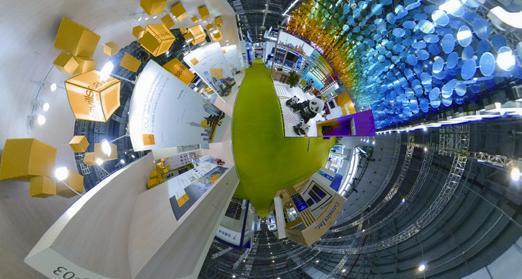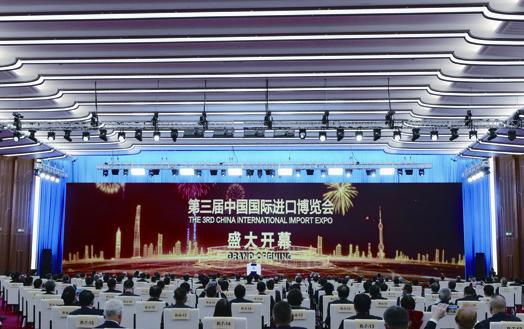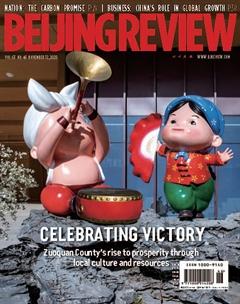An Accessible Market

President Xi Jinping gave another shot in the arm to the China International Import Expo (CIIE), a major platform he had initiated to bolster global trade, by announcing a fresh round of opening-up measures on November 4.
“Our aim is to turn the China market into a market for the world, a market shared by all, and a market accessible to all,” Xi said while delivering a keynote speech via video link at the opening ceremony of the Third CIIE. The expo was convened as scheduled following Chinas successful containment of the novel coronavirus disease (COVID-19).
Stronger impetus
To achieve such an aim, Xi stressed nurturing new pacesetters of opening up, growing foreign trade innovatively, improving business environment, and deepening bilateral, multilateral and regional cooperation.
He said China will continue to leverage the pioneering role of pilot free trade zones(FTZs) and free trade ports in steering opening up, introduce a negative list for crossborder service trade and open still wider in areas like the digital economy and the Internet.
The catalog of technologies prohibited or restricted from import will be shortened, foreign-related legal framework will be more open and transparent, and intellectual property protection will be strengthened, Xi said.
He said China stands ready to sign high- standard free trade agreements with more countries, and will work with related countries to promote high-quality Belt and Road cooperation and build a community with a shared future for humanity.
Notwithstanding COVID-19, Chinas pace of opening up has not been hindered but quickened. The items on the national negative list for foreign investment have been cut from 40 to 33 and the number of pilot FTZs has increased from 18 to 21.
With the Foreign Investment Law taking effect on January 1, foreign investors interests have better protection.
Growing appeal
At a time when the pandemic has added more uncertainties and challenges to the global economy, convening the import expo offline as scheduled shows Chinas major strategic achievements in containing COVID-19 as well as its economic resilience.China is the first major economy to return to growth from the economic fallout of the COVID-19 epidemic with its economy expanding 0.7 percent year on year in the first nine months.
In the same period, its foreign trade of goods totaled 23.12 trillion yuan ($3.46 trillion), up 0.7 percent year on year, and paid-in foreign investment rose 5.2 percent from a year earlier.
Multinational companies have gravitated toward the weeklong expo as a vote of confidence in the Chinese economy, with a lot of them becoming regulars at the annual event.
Up to 70 percent of the worlds top 500 companies that participated in the first two expos were seen this year, and the average exhibition area for the worlds top 500 companies and industry leaders increased by 14 percent year on year.
This years expo is believed to be one of the largest events across the world in 2020.
“China will be probably one of the only countries in the world where the market will be still growing,” Jean-Paul Agon, CEO of LOreal, said, adding that the conglomerates sales on the Chinese mainland grew by 30 percent in the second quarter.
Agon said LOreal is improving its performance in e-commerce in the rest of the world thanks to what it has learned in China.
With a total population of 1.4 billion and a middle-income group that exceeds 400 million, China has a tremendously huge market that is the most promising in the world. Its goods import is estimated to top $22 trillion in the coming decade.
Trade propeller
The expo is the worlds first import expo held at the national level, an innovation in the history of global trade.Since its debut, the platform for international procurement, investment promotion, cultural exchange, and open cooperation has evolved into an international public good.
The inaugural expo in 2018 drew more than 3,600 exhibitors from 172 countries, regions and international organizations, and attracted more than 400,000 buyers, who agreed on some $57.83 billion of intended deals in six days.
The second expo was attended by exhibitors from a total of 181 countries, regions and international organizations, and attracted more than 3,800 enterprises who reached $71.13 billion worth of tentative deals for one-year purchases of goods and services.
Cecilia Qi, Vice President and General Manager of Pharma and Vaccines, GSK China, said the CIIE provides China with a platform to embrace openness and showcase innovative results, and also brings opportunities for mutual benefits and inclusiveness to the world.
The CIIE has generated a “spillover effect” that keeps accelerating the reception of many innovative products in China, she said.
Jerry Zhang, Executive Vice Chairman and CEO of Standard Chartered Bank (China) Limited, said, “China is transforming from a large trading country to a trading powerhouse, and has become an important engine of economic globalization and a stabilizing factor in international trade.”

